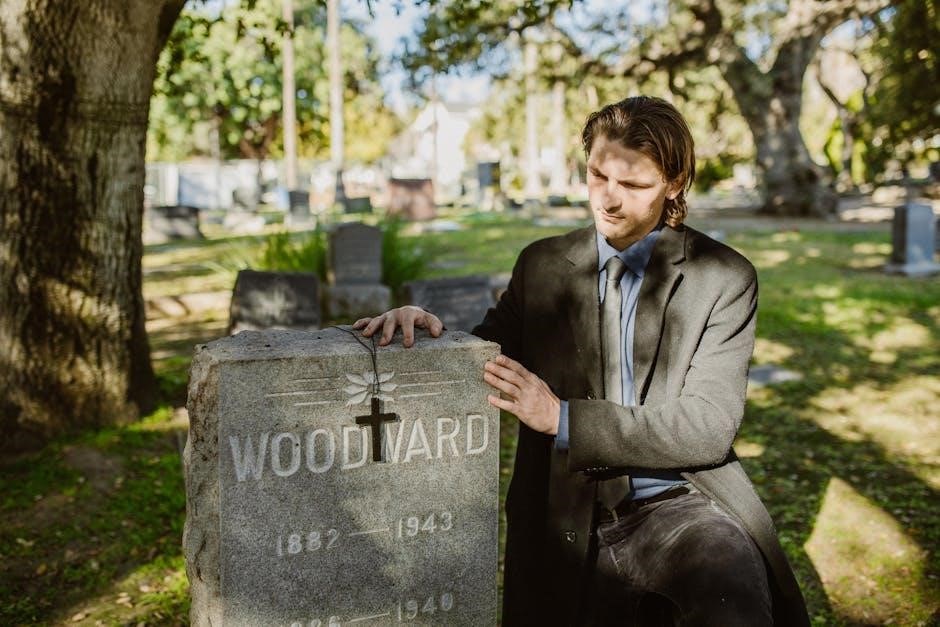Bronnie Ware’s groundbreaking work reveals the most common regrets of the dying, offering profound insights into living a fulfilling life. These regrets, gathered from years of palliative care experience, highlight what truly matters most to people in their final days. Reflecting on these regrets can inspire meaningful change and a deeper appreciation for life’s precious moments.

The Five Regrets of the Dying
Bronnie Ware’s research identifies five profound regrets expressed by the dying, revealing universal truths about life, happiness, and fulfillment. These regrets underscore the importance of living authentically, nurturing relationships, and prioritizing personal well-being over societal expectations. They serve as a powerful reminder to reevaluate our life choices and aspirations.
I Wish I Had the Courage to Live a Life True to Myself
Bronnie Ware’s work reveals that the most common regret among the dying is the wish to have lived a life true to oneself. Many individuals realize too late that they prioritized others’ expectations over their own desires. This regret often stems from fear—fear of judgment, rejection, or failure—which leads to a life of compromise and unfulfilled potential;
Living authentically requires self-awareness and courage. Those who express this regret often wish they had pursued their passions, taken risks, and embraced their uniqueness rather than conforming to societal norms. They lament the opportunities missed and the happiness sacrificed for the sake of approval.
This regret underscores the importance of aligning actions with personal values and aspirations. It serves as a poignant reminder to reflect on our choices and ensure we are living a life that truly reflects who we are. By doing so, we can avoid the pain of looking back and wondering what could have been.

Ultimately, this regret teaches us to embrace our true selves and not let fear dictate our path. It encourages us to take control of our lives and make choices that bring fulfillment and joy, rather than trying to meet the expectations of others. This is a powerful lesson for living a more authentic and meaningful life.
I Wish I Didn’t Work So Hard
Many individuals nearing the end of their lives express deep regret over dedicating too much of their time and energy to work. They often realize that the long hours, stress, and sacrifices made for career success came at the cost of precious moments with loved ones and personal fulfillment.
This regret highlights the imbalance many people strike between professional ambition and personal life. For some, the pursuit of financial security or status becomes an all-consuming force, leading to missed opportunities to nurture relationships, explore passions, or simply enjoy life’s simple pleasures.

Those who express this regret frequently wish they had prioritized time with family and friends, as these relationships are often what bring the most joy and comfort in life. They also lament the physical and emotional toll that excessive work took on their health and well-being.
This regret serves as a powerful reminder to reevaluate priorities and strive for a healthier work-life balance. It encourages us to recognize that success is not solely defined by professional achievements but by the quality of our personal connections and the fulfillment we derive from life’s experiences.

By learning from this regret, we can make conscious choices to create a life where work does not overshadow what truly matters—love, connection, and the pursuit of happiness.
I Wish I Had the Courage to Express My Feelings

Many people nearing the end of their lives express regret over not having the courage to openly express their feelings. This regret often stems from unspoken emotions, unresolved conflicts, or opportunities to share love and appreciation that were never seized.
Those who harbor this regret frequently reflect on moments where fear of judgment, rejection, or awkwardness held them back. They realize that holding onto emotions, whether positive or negative, can lead to a sense of incompleteness and disconnection.
This regret underscores the importance of communication in building meaningful relationships. People often wish they had been more honest about their feelings, whether it was telling a loved one how much they cared, standing up for themselves, or resolving misunderstandings.

The weight of unexpressed emotions can be profound, leading to what-ifs and a sense of missed opportunities. This regret serves as a reminder to embrace vulnerability and prioritize openness in our interactions with others.
By sharing our true feelings, we foster deeper connections and create a sense of closure, allowing ourselves and others to live more authentically and without regret.
I Wish I Had Stayed in Touch with My Friends
Many individuals nearing the end of their lives express deep regret over losing touch with old friends. As responsibilities and challenges pile up, friendships often take a backseat, leaving people with a sense of isolation and missed opportunities for connection.
This regret highlights the importance of nurturing relationships throughout life. Friends provide support, shared memories, and a sense of belonging, which are irreplaceable. Those who express this regret often wish they had prioritized staying in touch, even as life became busy.

In their final days, people realize that true friendships are a rare and precious gift. They often lament the moments they allowed friendships to fade due to neglect or a lack of effort. This regret serves as a poignant reminder to value and maintain connections with others.
By prioritizing friendships and making time for loved ones, we can build a stronger sense of community and reduce the likelihood of feeling isolated or disconnected in later life. This lesson encourages us to cherish and nurture our relationships while we still can.
Ultimately, this regret underscores the enduring importance of friendship in a fulfilling and meaningful life.
I Wish I Had Let Myself Be Happier
Among the most poignant regrets expressed by the dying is the wish to have embraced happiness more fully during their lives. Many individuals realize too late that they allowed societal expectations, fear of failure, or self-imposed pressures to overshadow their own desires for joy and fulfillment.
This regret often stems from a tendency to prioritize productivity and perfection over personal contentment. People frequently suppress their authentic selves to meet external standards, only to realize in their final days that true happiness comes from living in alignment with their values and passions.
Those who express this regret often wish they had been more present in life’s moments, allowing themselves to experience joy without guilt or hesitation. They recognize that life is short and that happiness is a choice, not a reward for achieving some idealized standard.

This lesson encourages us to reevaluate our priorities and embrace the beauty of imperfection. By letting go of unnecessary burdens and focusing on what truly brings us joy, we can live more authentic and satisfying lives.
In essence, this regret reminds us that happiness is not something to be delayed but cultivated in every moment, fostering a life of no regrets.
Bronnie Ware’s insightful exploration of the five most common regrets of the dying offers a powerful reminder to reevaluate our priorities and live more intentionally. These regrets, shared by individuals nearing the end of their lives, reveal universal truths about what truly matters: authenticity, relationships, and personal happiness.
The regrets highlight the importance of living a life aligned with one’s values rather than societal expectations. They remind us to cherish time with loved ones, pursue our passions, and embrace joy without delay. By heeding these lessons, we can avoid the pitfalls of a life unfulfilled and create meaningful, lasting memories.
Ultimately, Ware’s work serves as a profound wake-up call, urging us to reflect on our own lives and make conscious choices to live more authentically. By doing so, we can cultivate a sense of fulfillment and contentment, ensuring that our final days are free from regret and filled with peace.

Let these regrets be a catalyst for change, inspiring us to embrace life’s preciousness and live in a way that honors our true selves and the people we love.

